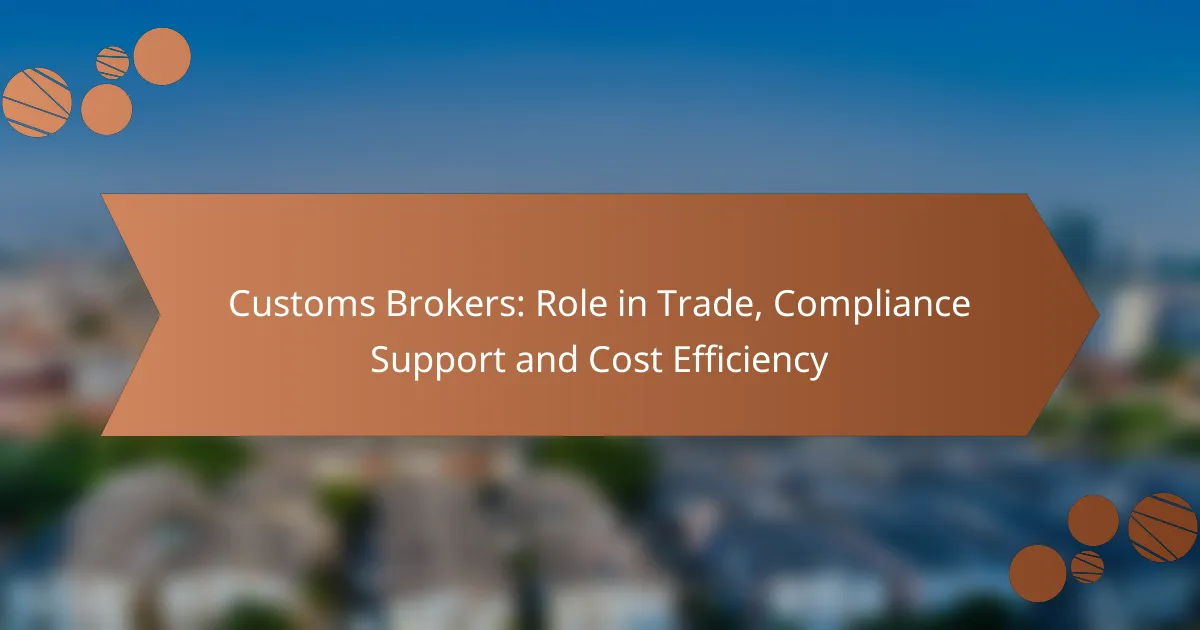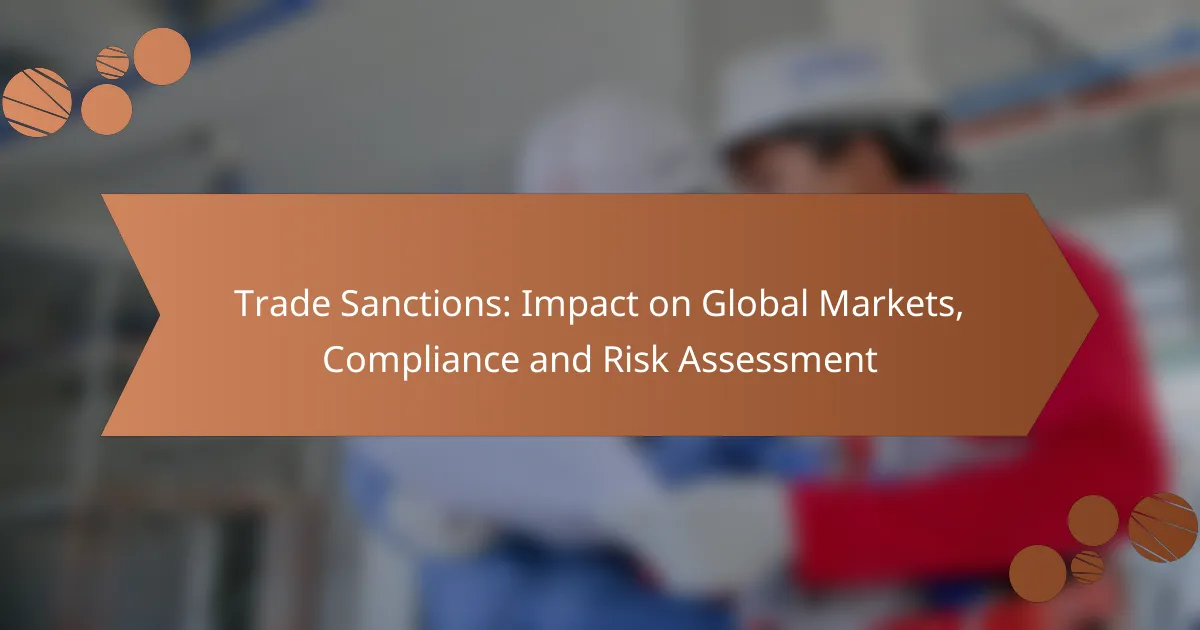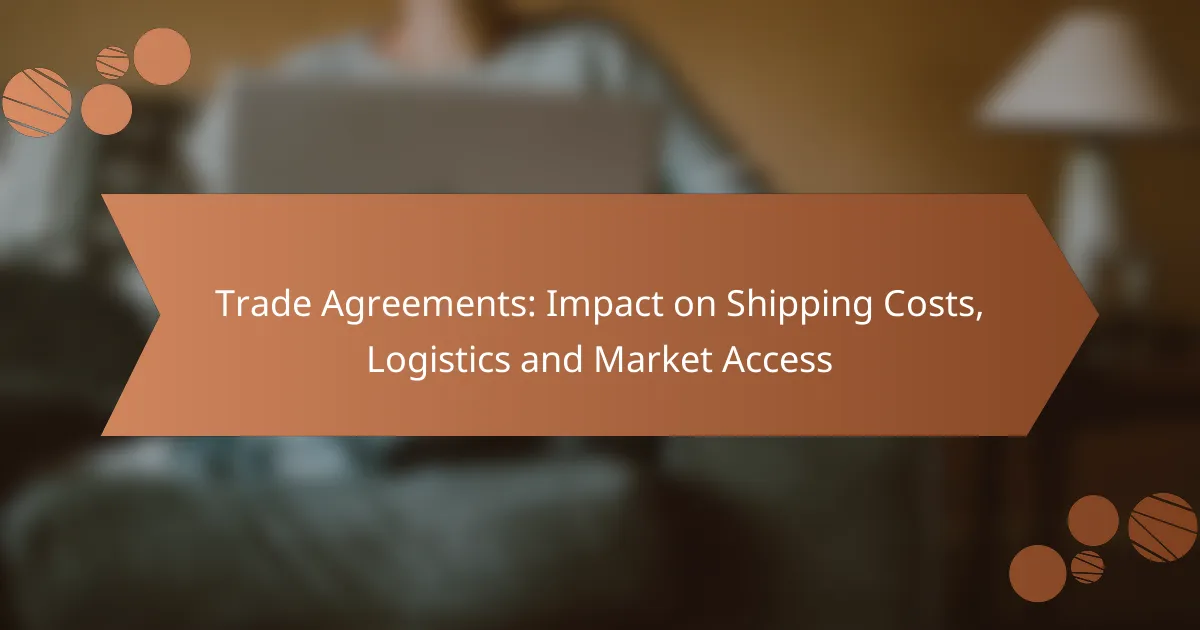Customs brokers are vital in facilitating efficient trade by ensuring compliance with regulations and streamlining import and export processes. They assist businesses in navigating the complexities of customs laws, minimizing risks of penalties and delays. By enhancing cost efficiency, customs brokers help companies save on duties and shipping expenses, making them an essential partner in international trade.
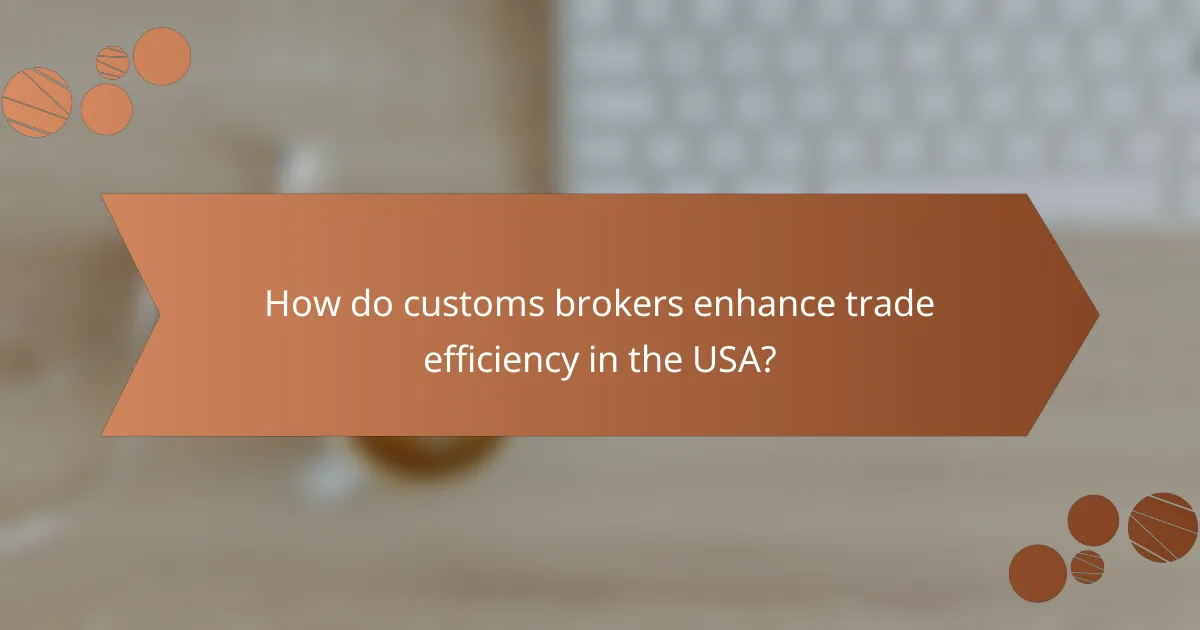
How do customs brokers enhance trade efficiency in the USA?
Customs brokers play a crucial role in enhancing trade efficiency in the USA by ensuring compliance with regulations and facilitating smooth import and export processes. They help businesses navigate complex customs requirements, ultimately saving time and reducing costs.
Streamlining import/export processes
Customs brokers streamline import and export processes by managing the necessary documentation and ensuring that all shipments comply with U.S. Customs and Border Protection (CBP) regulations. They prepare and submit required forms, such as the Entry Summary (CBP Form 7501), which helps expedite the clearance of goods.
By leveraging their expertise, customs brokers can identify the most efficient shipping methods and routes, which can lead to faster delivery times. This efficiency is particularly beneficial for businesses that rely on timely inventory replenishment or just-in-time manufacturing.
Reducing delays and penalties
Customs brokers significantly reduce the risk of delays and penalties associated with customs compliance. By ensuring that all documentation is accurate and complete, they help prevent common issues that can lead to shipment holds or fines. For instance, a missing or incorrect Harmonized Tariff Schedule (HTS) code can result in costly delays.
Additionally, customs brokers stay updated on changing regulations and tariffs, allowing businesses to adapt quickly and avoid potential penalties. This proactive approach can save companies thousands of dollars in unexpected costs.
Facilitating communication with customs
Customs brokers act as intermediaries between businesses and customs authorities, facilitating clear and effective communication. They help clarify any questions or concerns that customs officials may have regarding a shipment, which can speed up the clearance process.
Moreover, customs brokers can provide valuable insights into customs procedures and requirements, helping businesses understand their obligations. This guidance is essential for maintaining compliance and avoiding issues that could disrupt trade operations.
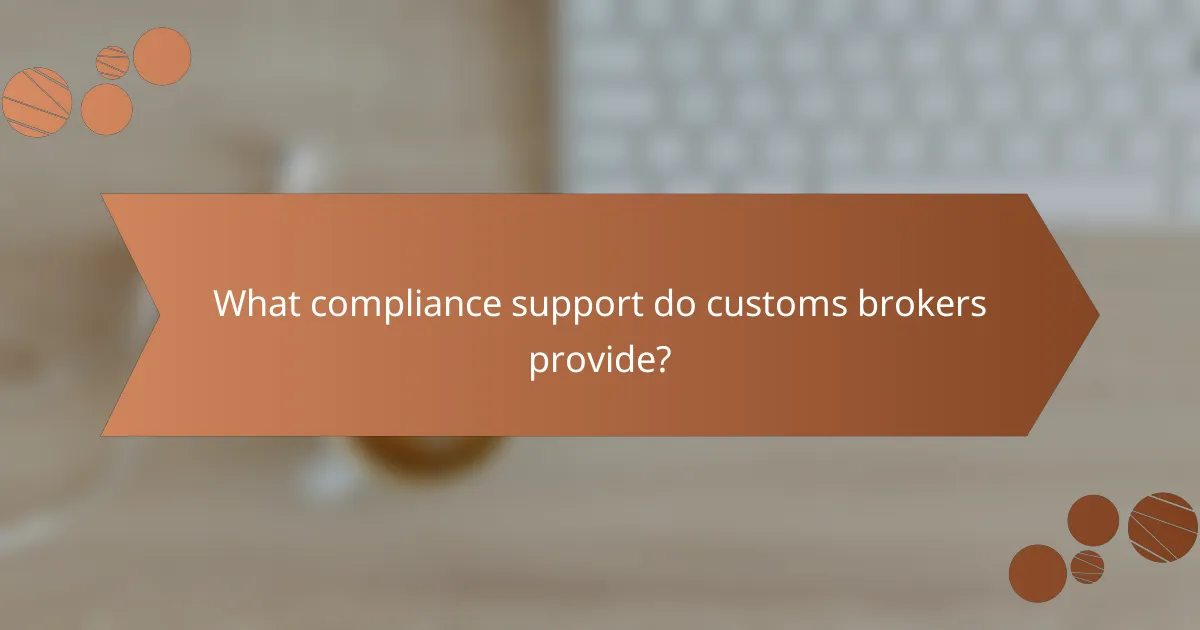
What compliance support do customs brokers provide?
Customs brokers offer essential compliance support by ensuring that businesses adhere to trade regulations and requirements. They help navigate the complex landscape of customs laws, minimizing the risk of penalties and delays in the import and export process.
Ensuring adherence to regulations
Customs brokers play a critical role in ensuring adherence to both domestic and international trade regulations. They stay updated on changes in laws and policies, which can vary significantly by country and product type. This knowledge helps businesses avoid costly fines and ensures smooth customs clearance.
For instance, a customs broker can inform a company about specific import restrictions on certain goods, such as agricultural products or electronics, which may require additional permits or inspections. This proactive approach helps businesses remain compliant and avoid disruptions in their supply chain.
Assisting with documentation
Proper documentation is vital in international trade, and customs brokers assist in preparing and submitting necessary paperwork. This includes invoices, packing lists, and certificates of origin, which are essential for customs clearance. Inaccurate or incomplete documentation can lead to delays and additional costs.
Customs brokers ensure that all documents meet the specific requirements of the destination country, reducing the likelihood of issues at the border. They can also help businesses understand the importance of maintaining accurate records for compliance audits and future shipments.
Advising on tariff classifications
Tariff classification is a crucial aspect of customs compliance, as it determines the duties and taxes applicable to imported goods. Customs brokers provide expert advice on how to classify products correctly according to the Harmonized System (HS) codes. Misclassification can result in significant financial penalties and increased costs.
By accurately classifying goods, customs brokers help businesses optimize their tariff payments and identify potential duty exemptions. They can also advise on trade agreements that may lower tariffs, allowing companies to save on import costs and improve their competitive edge in the market.

How do customs brokers contribute to cost efficiency?
Customs brokers enhance cost efficiency by streamlining the import and export processes, which can lead to significant savings in duties and shipping expenses. Their expertise in compliance and logistics helps businesses navigate complex regulations, ultimately reducing unnecessary costs.
Minimizing duty payments
Customs brokers play a crucial role in minimizing duty payments by ensuring that goods are classified correctly under tariff codes. Accurate classification can lead to lower duty rates, as different products may be subject to varying tariffs. For example, a broker might identify a product that qualifies for a preferential trade agreement, reducing the duty from a standard rate to a significantly lower one.
Additionally, brokers can advise on the use of duty drawback programs, which allow businesses to reclaim duties on imported goods that are later exported. This can result in substantial savings, especially for companies that frequently import and re-export products.
Reducing shipping costs
By leveraging their relationships with carriers and freight forwarders, customs brokers can negotiate better shipping rates for their clients. They often have access to volume discounts that individual businesses may not be able to secure on their own. This can lead to lower overall shipping expenses, which is vital for maintaining competitive pricing.
Moreover, customs brokers can optimize shipping routes and methods, ensuring that goods are transported in the most cost-effective manner. For instance, they may recommend consolidating shipments to reduce costs associated with multiple deliveries.
Offering bundled services
Many customs brokers provide bundled services that combine customs clearance, freight forwarding, and logistics management. This one-stop-shop approach can lead to cost savings by reducing the need for multiple service providers, each with their own fees. Businesses can benefit from streamlined communication and fewer administrative burdens.
Furthermore, bundled services often include additional support, such as compliance consulting and risk management, which can prevent costly delays and fines. By choosing a broker that offers comprehensive solutions, companies can enhance their operational efficiency while keeping costs in check.

What criteria should businesses consider when selecting a customs broker?
When selecting a customs broker, businesses should prioritize experience, geographic coverage, and technology capabilities. These factors ensure compliance with regulations, efficient processing of shipments, and effective tracking of goods throughout the supply chain.
Experience in specific industries
Customs brokers with experience in specific industries can provide tailored advice and solutions that align with unique regulatory requirements. For example, brokers familiar with the pharmaceutical sector understand the stringent compliance needed for importing medical products.
Consider brokers who have worked with businesses similar to yours, as they will be more adept at navigating industry-specific challenges. Asking for case studies or references can help gauge their expertise in your field.
Geographic coverage and local expertise
Geographic coverage is crucial, especially if your business operates in multiple countries. A customs broker with a strong local presence in key markets can facilitate smoother transactions and quicker clearance times.
Local expertise also means understanding regional regulations and customs procedures. Brokers familiar with the nuances of local laws can help avoid costly delays and penalties, making them invaluable for international trade.
Technology and tracking capabilities
Robust technology and tracking capabilities are essential for modern customs brokers. Look for brokers that offer online platforms for real-time tracking of shipments, which can enhance transparency and communication.
Additionally, brokers using advanced software can streamline documentation processes and reduce errors, leading to more efficient customs clearance. Ensure the broker’s technology integrates well with your existing systems for optimal performance.

How do customs brokers manage risk in international trade?
Customs brokers manage risk in international trade by ensuring compliance with regulations and facilitating smooth transactions. They identify potential issues that could lead to delays or penalties and implement strategies to mitigate these risks.
Identifying compliance risks
Identifying compliance risks involves assessing the various regulations that govern international trade, including customs laws, tariffs, and import/export restrictions. Brokers must stay updated on changes in legislation that could impact their clients’ shipments.
Common compliance risks include misclassification of goods, incorrect valuation, and failure to meet documentation requirements. For example, a misclassified item could lead to significant fines and delays, making it essential for brokers to conduct thorough reviews of all shipping documents.
Implementing risk mitigation strategies
Implementing risk mitigation strategies requires customs brokers to develop comprehensive compliance programs tailored to their clients’ specific needs. This may involve training staff on regulatory requirements, conducting regular audits, and utilizing technology to streamline processes.
Effective strategies include maintaining accurate records, using reliable software for customs declarations, and establishing strong relationships with customs authorities. Brokers should also advise clients on best practices, such as ensuring that all shipments are properly documented and classified to minimize the risk of non-compliance.

What are the emerging trends in customs brokerage?
Emerging trends in customs brokerage focus on enhancing efficiency, compliance, and transparency in international trade. Key developments include the integration of digital tools, automation, and a growing emphasis on sustainability in logistics.
Adoption of digital tools and automation
The adoption of digital tools and automation is transforming customs brokerage by streamlining processes and reducing manual errors. Technologies such as electronic data interchange (EDI) and cloud-based platforms facilitate real-time information sharing between stakeholders, improving communication and compliance.
Customs brokers are increasingly using software solutions that automate documentation, classification, and tariff calculations. This not only speeds up the clearance process but also minimizes the risk of costly delays and penalties due to compliance issues. For example, automated systems can process customs declarations in minutes instead of hours.
To leverage these advancements, businesses should invest in training for their staff to effectively use these digital tools. Additionally, staying updated on the latest software and technology trends can provide a competitive edge in the fast-evolving landscape of customs brokerage.
